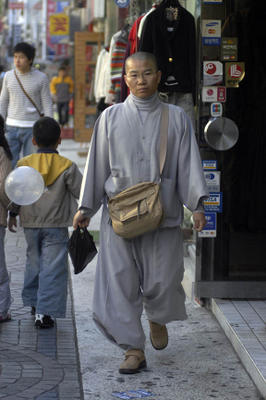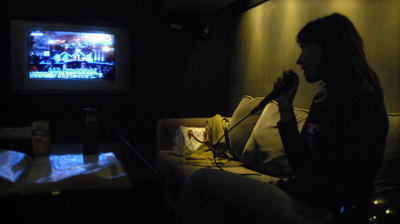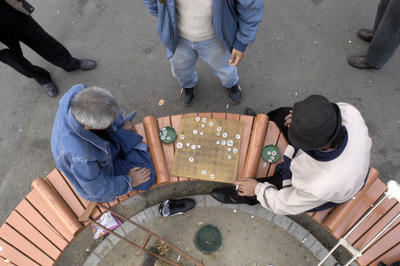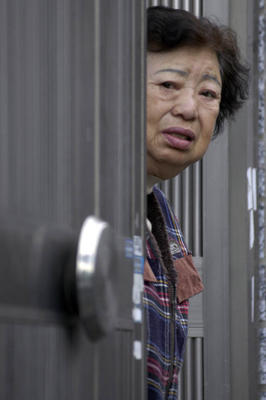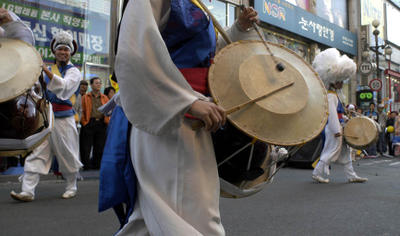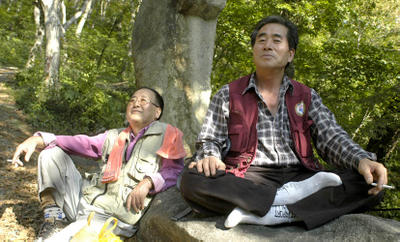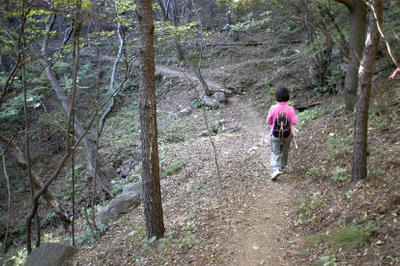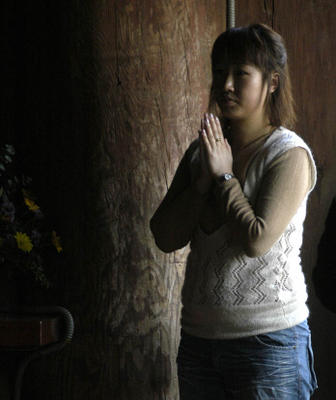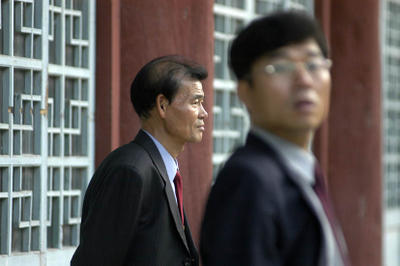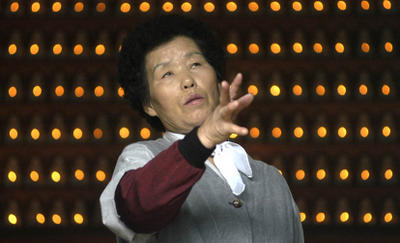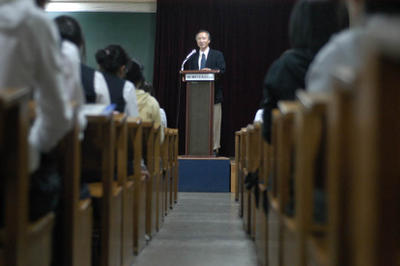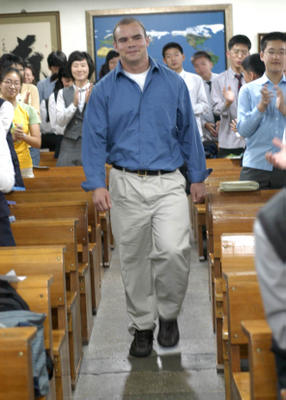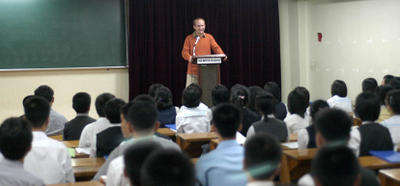Somebody please laugh.
Well, since we're on the topic of pathogens, I got to witness my own little epidemic this past week. The title of this week's first blog story: Obsessive-Compulsives Need Not Apply.
Any poultry farmer worth his salt can tell you exactly why schools are breeding grounds for viruses: Too many animals crammed together in too small a space for too much time. A boy came into one of my classes last week with a runny nose (the 17th, if memory serves). By Wednesday of this week the virus was reeking havoc among the students, teachers and staff.
An airborne pathogenlike a flu or cold is an unstoppable assailant: We all have to breath, you know. Complicating matters are the children: picking their noses, sneezing, coughing, failing to wash their hands: All the while sharing school supplies, holding hands, typing and opening doors. Hand a piece of chalk to a student and he'll hand you back a billion genetically-enhanced nanoscopic invaders slavering over the opportunity to turn your lungs into an outtake from The Lord of The Rings. Short of locking sick students in sealed plastic bubbles, there is no stopping an infection once it has walked into ESS.
The trick is to submit to the virus early on. The pathogen gets stronger with each new generation, the symptoms growing more and more severe. Catching the weakest version early on innocolates you to later, more malevolent strains. I caught the virus Friday and suffered some sniffles and a mild sore throat over the weekend. My students coughed, sniffled and sneezed all day Monday. By Wednesday between three and five children were missing from many of my classes, and on Thursday Ha-young had to take the day off to take her own child to the doctor.
Each student in his or her turn caught, fought and beat the virus over the course of a week. By Friday the invisible predator had moved on to hunt lesser prey. Saturday morning I was talking to my mother on the phone and she said everyone she knows in Atlanta has had or currently has a similar cold. She came down with it yesterday. What are the chances it's the same virus? This question seems to haunt any story I read or see about the bird flu. If it jumps to people and is spread like a normal flu...
...
Ah, well, isn't that nice? Lovely day, isn't it? How about a little comedy? It's time for The Korean Minute: Sayings From The Land That Slept Through English Class.
"There is no off-season for friends." (Or bag limit, either. Sweater)
"Global Fashion from Moko Brand are actually easily washable wear and also it can make a moment of rest." (No shit? Washable, you say? Advertisement in Nampo-dong)
Here are this weeks random photos:

This is only the second person I have seen in a wheelchair since arriving in Korea. He wasn't moving. I think he was asleep. People were ignoring him until I raised my camera and took a photograph. Then somebody got their nose out of joint and the clerk from the convenience store came over and shooed me off. Sometimes it feels like the Koreans pretend their disabled, poor and retarded people don't exist. The government certainly doesn't pay anything more than lip-service to the needs of the handicapped. There are few ramps or handicapped facilities. God knows how someone without legs gets to the grocery store. It is one of the few areas of Korean culture that piss me off.
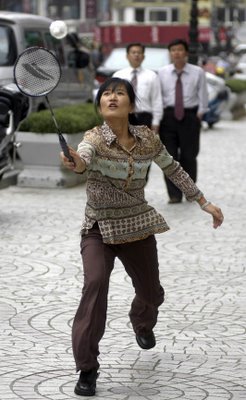
Two clothing boutique clerks struck up a badminton match on the sidewalk outside their shop in Nampo-dong during a break. I photographed them for a few minutes.
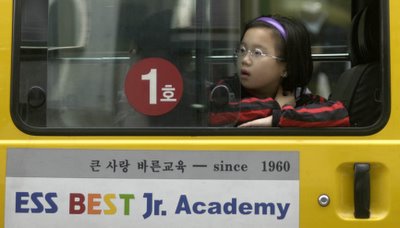
And then I realized I had to get to work.

Man, the old people here are so damn cool.

A fortune teller near the theater. She's carved out a little space between a fastfood restaurant and PC-bong and filled it with all the accuitrements of fortune-telling: Flowers, beads, incence, various flags and smiling photos of famous Buddhist monks. For a few thousand won she'll tell you about your future...In Korean. I think I'm going to record her predictions for my life and have my high school kids translate it for a class project.
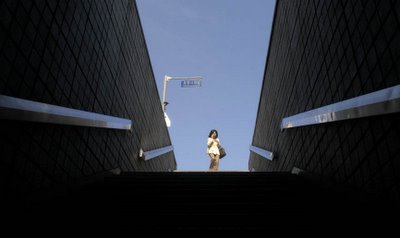
What can I really say about this photo? Busan street photography.

This guy gave me the best haircut I've had in two years. Cost me three bucks. Language barrier? No problem. Just point out the cut you want from the pictures on the wall. How did I find this place? Easy, just follow the Russians.
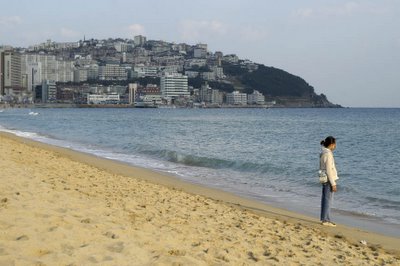
Now that the weather has turned colder there are less and less people on the beach at Haeundae. Still, the ocean is mesmerizing in the late afternoon light. The buildings rising behind the girl is where all the rich people in Busan live.
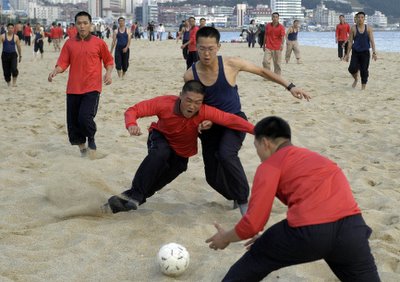
These guys are part of the massive security detail brought in to watch over the APEC meetings starting November 23rd. They took a break from their training to play a little beach soccer.
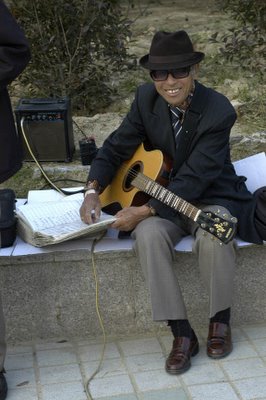
This old man was just playing the blues on the seawall at Haeundae for anyone who would listen. You can't see them, but he was surrounded by drunks.
OK, onward with the next story.
I usually spend my breaks in the teacher's prep room suiting up for the next murderous onslaught, er, I mean getting prepared for class. The place is usually a madhouse. Each teacher has a tiny wooden desk with a glass deck and a drawer for supplies. Between squeezing past one another we listen to tapes of our students' readings, check their journals, grade papers and plan out our next classes. Some teachers have so many books, journals and material on their desks you can barely see them.
I sit right on the corner next to the beautiful Ms. Ha. When I'm not sweating my next class I'm trying to get in a few words with her or joking around with The SuperKorean (Ms. Kang). More often then not I just end up helping Ms. Ha figure out some random American phrase like 'NASCAR.' Sometimes when things calm down an exchange will end in an eye-opening, perspective-altering exchange.
One such conversation happened Thursday. In a gesture of kindness our director, Mr. Kim, brought a big paper bag of sweets, donuts and sandwiches from Paris Baguette. It's tangerine season, and so In-Hye added a sack of the sweet fruit to the mix. Throughout the day all the teachers snacked on the goodies.
Between bites of sugary goodness I blurted out the Korean word for bread: Bbang (pronounced bah-ng, not bae-ng like an explosion). The SuperKorean giggled and corrected my pronunciation. She then asked Julie what the French called bread. Paen, Julie said. It sounded remarkably like the Korean word, 'Bang,' and I said as much to The SuperKorean.
"Yes. We adopted the word from the French," she said. This baffled me.
"What did they call bread before the French showed up?" I asked innocently. The SuperKorean didn't flinch.
"We didn't have bread until the French came," she said. This really blew my mind. The first thing that popped into my head was the Koreans' current love affair with fast food chains like McDonalds and Outback Steakhouse. It's like every new wave of white people tries to make the Koreans fat. The French failed miserably, maybe McDonalds would too. One can only hope.
Now For The Tale of Two Tae-hyeons.
My worst class is 5-6P. Imagine twenty-two of the most incalcitrant Korean youths thrust into an English academy by their parents in a desparate bid to give them a chance in life and you have 5-6P. They range in age from 10 to 13. They're grasp of English is no better than my youngest children, the 1-2P's. They could give a damn about English, school or me. I don't bother planning for this class. I show up ready to instill fear, play games and little more.
Like any band of outlaws, this group has a natural leader: Tae-hyeon Yi. Only twelve years old, he is the quintessential misfit: Hair askew, clothed in baggy, ragged threads, his face always screwed up into this disturbing scowl punctuated with these dark brown Korean eyes that scream 'fuck you' whenever he looks in my direction. Only thirteen years old, Tae-hyeon Yi stands five foot eight inches high, slightly taller than me and a solid foot taller than the next tallest person in the class.
In the world of children, size is a tanglible source of power. How he or she handles this power reflects upon the child's character. Tae-hyeon Yi makes no effort to be benevolent, chosing instead to exploit those smaller and weaker than he (everyone except the girls. Tae-hyeon is tellingly wary of the opposite sex).
It's strange how people react to a bully. The strong ones avoid Tae-hyeon or chose to fight him instead of submit. He mostly avoids these few individuals. The weaker boys chose to appease Tae-hyeon and exchange their dignity for a reduced allotment of abuse. They are masters at redirecting his attention in my direction. The six or seven boys gather around Tae-hyeon Yi in the back of the classroom like court jesters and make a show of disrespecting me for their general amusement.
5-6P stresses me out, but deep down it doesn't really matter. They're losers. They probably won't realize this until it's too late, but I just can't be bothered. What I do care about is Tae-hyeon. No, not that one.
In the front of the class sits a boy with his head buried in book. His name is Tae-hyeon Kim. Friendless, fragile, small, Tae-hyeon Kim is the smartest child in the class as well as an Untouchable of sorts. Though he is also thirteen years old, Tae-hyeon Kim is a foot shorter and at least twenty kilos lighter than Tae-hyeon Yi. His pimply skin clings to his thin, bony body and his eyes are windows into a lonely, isolated world. He wears his puniness like a scarlet letter. No one in the class will sit anywhere near him, nor help him with the puzzles I hand out. No one talks to him. Tae-hyeon Kim happens to be the smartest boy in the class.
His brilliance and his weakness set up Tae-hyeon Kim to be the ideal target for the larger Tae-hyeon. The thug wastes no opportunity to punish Tae-hyeon Kim for the crime of being helpless and weak. One time I turned around and watched helplessly as he slugged Tae-hyeon Kim in the face. My tone reached a volumn I never thought I could attain: I threw Tae-hyeon out the door with my voice. The class went dead silent. After he left the classroom it took me a few minutes to compose myself. A girl went and got a napkin and I helped wipe the tears from Tae-hyeon Kim's face. Nothing angers me like a bully. I too was once a Tae-hyeon Kim.
I was thrust into a new school fifth grade year to make the commute easier on my folks. I was not a socially adept child. I had a hard time making friends. I was fat. I was short. I was the natural target for a bully named Jonathan Arnold, and he made much of my fifth grade year a decent into hell. What I now find so strange was that Jonathan Arnold was one of only two people I developed a relationship with that terrible, lonely year. It was a violent, abusive relationship, but in some ways he was the only person who made time for me. Bizarre as that sounds, the story got even stranger. The following fall as I was signing up for my sixth grade classes, Jonathan Arnold approached me with his parents and introduced me as his best friend in the whole world. At the time, this baffled me like nothing else possibly could. Now I know better.
The boy I once was hates Tae-hyeon Yi, and the man that boy grew up to be understands that bullies aren't born, they're made. The violence and abuse they turn on other children is only a mirror image of the violence and abuse visited on them by a bigger, meaner person or people, such as a parent. The weakness and fear they hate so much in others is a reflection of that same weakness and fear within themselves. A bully beats other children because it is the only relationship he understands. When I look into Tae-hyeon's eyes I see his hate, his anger, his sadness, and then I also see his fear, his weakness, his own personal nightmarish isolation.
In the end, Tae-hyeon Kim has the strength to heal the wounds inflicted by Tae-hyeon Yi. His brilliant mind will carry him far in life. With time he will forget or learn from these terrible experiences at the hands of a bully, just as I did. Who I worry about is the bully himself. How is Tae-hyeon Yi going to turn out? Who is going to get to the bottom of his rage? Who will be there to catch him when he falls? Is it my job? Should I investigate? Should I alert the authorities? Maybe there is nothing to any of this and it's all just a case of overblown teenage angst. I am living in the dark, glimpsing a life in 45-minute distracted blocks. A lot happens in the remaining twenty-three hours and fifteen minutes that no one sees.
On Friday Mrs. Nam (Ha-young) told me the 5-6P class was cancelled indefinently. I would not have to put up with that abuse any longer. Outwardly, I was exstatic. Inwardly, I my thoughts turned to Tae-hyeon Yi, who I would never see again. I hope he turns out alright.
On the bus to work Thursday I met an Austrailian named Alex. He was teaching at Gosin University and living in Hamjigreen with his wife and children. A nice fellow, he invited me to come to the free language class near Busan Station on Saturday and gave me good directions.
Saturday morning and I showered, dressed and caught the 508 to Busan Station. After a bit of walking I came to the post-office building and caught the elevator with a friendly Russian student named Katya to the 8th floor. People of a variety of races (I saw my third black person!) and nations milled about, drinking green tea and snacking on chips. Katya and I took a seat and made small talk until the start of class.
The program is called Hangul Soetang, and for virtually nothing (3,000 won a month) I get my own personal Korean teacher for two hours every Saturday. This being my first time, I shared my instructor with a Russian violin tutor named Alla. A nice Korean woman and three Koreans student volunteers walked us through the basics: Hello, goodbye, I'm sorry, excuse me, your welcome, thank you, etc.

English was the language we used to broker our educational exchanges. The Koreans spoke in English when they needed to clarify a new phrase. Alla spoke English when she needed to talk to me. The three students picked my brain about English words and phrases that were giving them a hard time. No one was purly a teacher or a student: We were all students of one another, coming from three very different traditions, and English was our playing field. It proved to be an eye-opening experience.
When you meet someone for the first time in Korea, there is a certain phrase you use for saying "How are you?" and it translates almost exactly into just that. However, if you see someone for a second time, you use an entirely different phrase that when translated means something like "Because we once met, I am now happy." Isn't that poetic?
I took the 302 out to Haeundae beach Sunday to see the Busan Aquarium. It's a really nice aquarium. I'd give you all kinds of neat information, facts and figures, but it was all written in Hangul. The only fact I nailed down was the giant acrylic panels that keep the sharks seperated from the tourists is a foot thick.
Most of what I have to report passed before my eyes.




It cost me 15,000 won to get in. The aquarium is right on the beach, so their water source is taken care of. For two hours I was treated to walls lined with blissfully imprisoned sea life. There were fish of all sizes, shapes and colors, crabs, shrimp and even sea otters and penguins. I felt really bad for the penguins. Their tank was barely as big as my apartment and dimly lit in florescent green. Trees were painted on the walls and the ceiling was blue to simulate the sky. That's shitty.
The fish had it much better. The tanks were large and clean and the fish looked healthy. Little kids pressed their snotty noses against the tanks and beat furiously with their fists against the unyielding acrylic. Parents took pictures, and the professional photographer in me noticed that all the main tanks were curved so the direct flash from people's tiny digital cameras wouldn't ruin the photos with too much glare. Good call.
The main attraction was a massive tank filled with giant grouper, seven-foot nurse sharks and rays of all types. Schools of silvery pompano, yellowfins and jacks flashed across the twenty-foot high clear plastic panels. A plexiglass tunnel allowed visitors to tour the inside of the tank. I watched as a beautiful loggerhead turtle as big as my suitcase slid by overhead. It was wonderful.
After a dinner of cheesy dankas I updated this blog for you good folks and made my way to Kaeungsung to attend a Holloween party. I'll write about that at a later date. Peace. --Notes
